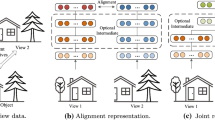Abstract
Co-training is a famous semi-supervised learning algorithm which can exploit unlabeled data to improve learning performance. Generally it works under a two-view setting (the input examples have two disjoint feature sets in nature), with the assumption that each view is sufficient to predict the label. However, in real-world applications due to feature corruption or feature noise, both views may be insufficient and co-training will suffer from these insufficient views. In this paper, we propose a novel algorithm named Weighted Co-training to deal with this problem. It identifies the newly labeled examples that are probably harmful for the other view, and decreases their weights in the training set to avoid the risk. The experimental results show that Weighted Co-training performs better than the state-of-art co-training algorithms on several benchmarks.
Similar content being viewed by others
Explore related subjects
Discover the latest articles and news from researchers in related subjects, suggested using machine learning.References
Miller D J, Uyar H S. A mixture of experts classifier with learning based on both labelled and unlabelled data. Advances in Neural Information Processing Systems, 1997, 571–577
Nigam K, McCallum A, Thrun S, Mitchell T. Text classification from labeled and unlabeled documents using EM. Machine Learning, 2000, 39(2/3): 103–134
Bennett K P, Demiriz A. Semi-supervised support vector machines. Advances in Neural Information Processing Systems, 1998, 368–374
Joachims T. Transductive inference for text classification using support vector machines. In: Proceedings of the 16th International Conference on Machine Learning. 1999, 200–209
Blum A, Chawla S. Learning from labeled and unlabeled data using graph mincuts. In: Proceedings of the 18th International Conference on Machine Learning. 2001, 19–26
Zhu X, Ghahramani Z, Lafferty J. Semi-supervised learning using gaussian fields and harmonic functions. In: Proceedings of the 20th International Conference on Machine Learning. 2003, 912–919
Zhou D, Bousquet O, Lal T N, Weston J, Schölkopf B. Learning with local and global consistency. Advances in Neural Information Processing Systems, 2003, 321–328
Blum A, Mitchell T. Combining labeled and unlabeled data with cotraining. In: Proceedings of the 11th Annual Conference on Computational Learning Theory. 1998, 92–100
Zhou Z H, Li M. Tri-training: exploiting unlabeled data using three classifiers. IEEE Transactions on Knowledge and Data Engineering, 2005, 17(11): 1529–1541
Zhou Z H, Li M. Semi-supervised learning by disagreement. Knowledge and Information System, 2010, 24(3): 415–439
Nigam K, Ghani R. Analyzing the effectiveness and applicability of co-training. In: Proceedings of the 10th International Conference on Information and Knowledge Management. 2000, 86–93
Goldman S A, Zhou Y. Enhancing supervised learning with unlabeled data. In: Proceedings of the 17th International Conference on Machine Learning. 2000, 327–334
Kiritchenko S, Matwin S. Email classification with co-training. In: Proceedings of the 2001 Conference of the Centre for Advanced Studies on Collaborative Research. 2001, 301–312
Maeireizo B, Litman D, Hwa R. Co-training for predicting emotions with spoken dialogue data. In: Proceedings of the ACL 2004 on Interactive Poster and Demonstration Sessions. 2004, 28
Wan X. Co-training for cross-lingual sentiment classification. In: Proceedings of the 47th Annual Meeting of the Association for Computational Linguistics and the 4th International Joint Conference on Natural Language Processing of the AFNLP. 2009, 235–243
Liu R, Cheng J, Lu H. A robust boosting tracker with minimum error bound in a co-training framework. In: Proceedings of the 12th IEEE International Conference on Computer Vision. 2009, 1459–1466
Abney S P. Bootstrapping. In: Proceedings of the 40th Annual Meeting of the Association for Computational Linguistics. 2002, 360–367
Balcan M F, Blum A, Yang K. Co-training and expansion: towards bridging theory and practice. Advances in Neural Information Processing Systems, 2004, 89–96
Wang W, Zhou Z H. A new analysis of co-training. In: Proceedings of the 27th International Conference on Machine Learning. 2010, 1135–1142
Wang W, Zhou Z H. Analyzing co-training style algorithms. In: Proceedings of the 18th European Conference on Machine Learning. 2007, 454–465
Wang W, Zhou Z H. Co-training with insufficient views. In: Proceedings of the 5th Asian Conference on Machine Learning. 2013, 467–482
Xu J, He H, Man H. DCPE co-training for classification. Neurocomputing, 2012, 86: 75–85
Kushmerick N. Learning to remove internet advertisements. In: Proceedings of the 3rd Annual Conference on Autonomous Agents. 1999, 175–181
Giles C L, Bollacker K D, Lawrence S. Citeseer: an automatic citation indexing system. In: Proceedings of the 3rd ACM International Conference on Digital Libraries. 1998, 89–98
Bisson G, Grimal C. Co-clustering of multi-view datasets: a parallelizable approach. In: Proceedings of the 12th IEEE International Conference on Data Mining. 2012, 828–833
Lichman M. UCI machine learning repository. 2013
Acknowledgements
This work was supported by the NSFC (61673202, 61305067), the Fundamental Research Funds for the Central Universities, and the Collaborative Innovation Center of Novel Software Technology and Industrialization.
Author information
Authors and Affiliations
Corresponding author
Additional information
Xiangyu Guo received his BS in Electronic Engineering from Xidian University, China in 2014. He received the National Scholarship in 2011. Currently he is a master student at the Department of Computer Science and Technology, Nanjing University, China. His research interests include machine learning and data mining.
Wei Wang is an associate professor at Department of Computer Science and Technology, Nanjing University, China. He received his PhD degree from Department of Computer Science and Technology, Nanjing University, China in 2012. His research interest mainly includes computational learning theory, especially in semi-supervised learning and active learning.
Electronic supplementary material
Rights and permissions
About this article
Cite this article
Guo, X., Wang, W. Towards making co-training suffer less from insufficient views. Front. Comput. Sci. 13, 99–105 (2019). https://doi.org/10.1007/s11704-018-7138-5
Received:
Accepted:
Published:
Issue Date:
DOI: https://doi.org/10.1007/s11704-018-7138-5




